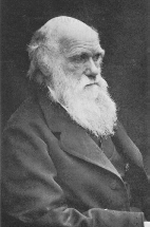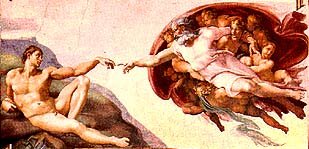
Evolution and Creationism: Chapter 1
Some Definitions
The first chapter of the book Life -- How Did it Get Here? By Evolution or by Creation? provides the following definitions of evolution and creation:
- evolution
refers to organic evolution -- the theory that the first living organism developed from nonliving matter. Then as it reproduced, it is said to have changed into different kinds of living things, producing ultimately all forms of life that have ever existed on earth, including humans. And all of this is believed to have been accomplished without intelligent direction or supernatural intervention.1 (Emphasis added)
- creationism
is the conclusion that the appearing of living things can only be explained by the existence of an Almighty God who designed and made the universe and all the basic kinds of life upon the earth.2 (Emphasis added).
Firstly, I submit that the emphasized phrase in the definition of evolution is not necessary to the theory of evolution, and, IMO, serves only to create a straw-man argument (theology versus science). It is entirely possible that the theory of evolution and faith can coexist; in fact Pope John Paul II has said as much.3 The theory of evolution and theology are not mutually exclusive although evolution does contradict a literal interpretation of the creation account.
More Definitions
In order to be more precise about discussing evolution, I submit the following definitions, taken from various FAQs in the talk.origins Archive:
- adaptation
- refers to the change of the traits of a population of organisms over time. For example, a type of insect adapts to pesticides, and the population develops immunity. This may, or may not, be because of mutation; nonetheless, adaptation has been observed. This point is not under debate, according to Life, although the mechanism that causes adaptation (mutation, or whatever) may be debated. The talk.origins Archive uses adaptation as the strict definition of biological evolution, and because adaptation has been observed, many would refer to biological evolution as a "fact". For purposes of clarity, I will strictly use the term "adaptation". Also, I'm far too influenced by post-modernist theory to enjoy saying that something is a "fact". Nonetheless, adaptation is an observed behaviour; Life agrees with this.
- the theory of evolution
- A number of theories that attempt to explain, to the best of current knowledge, by what mechanisms adaptation occurs.
- The theory of common descent
- The theory that all living creatures on earth share a common, remote ancestor. More specifically, given any two living creatures there was a creature that is ancestor to both.
- young earth creationism
- An interpretation of Genesis 1 in which days are taken to be 24 hour events, and that by saying animals reproduce "after their kind" evolution is precluded.
- old earth creationism
- An interpretation of Genesis 1 in which days are taken to be figurative lengths of time, and the time scales given by geologists are generally correct. However, the special creation of man precludes common descent. Life takes the position of old earth creationism.4
Points of Debate
Having made these definitions, let us now determine a classification of various points of debate. Arguments can be:
| For the theory of evolution | Against the theory of evolution |
| For the theory of common descent | Against the theory of common descent |
| For the theory of creation | Against the theory of creation |
| For the existence of divinity | Against the existence of divinity |
"For Divinity" is not "For Creation"
It should be pointed out that although an argument for the theory of creation is necessarily an argument against the theory of common descent, the same cannot be said of an argument for the existence of divinity. Because of the way in which Life has defined the theory of creationism, it is incompatible with evolution. However, as Warren Kurt VonRoeschlaub points out:
Evolution, specifically common descent, tells us how life came to where it is, but it does not say why. [...] Evolution cannot say exactly why common descent chose the paths that it did.5
Arguments for the existence of divinity merely explain why, not how.
"Against Evolution" is not "For Creation"
It should further be noted that an argument against the theory of evolution or the theory of common descent is not necessarily an argument for creation. One could argue a third position, say that aliens synthesized all life in complex extraterrestrial laboratories. An argument against evolution supports the theory of creationism only as much as it supports the theory of extraterritrial synthesis.
Success Criteria For Life
What is clear is that for Life to successfully argue its position, it needs to present arguments for the theory of creation. It does not suffice to merely argue against the theories of evolution and common descent or argue for the existence of divinity.
Commentary
Personally, I think Life has set itself up for an exceptionally difficult task. Life argues that the origins of life cannot be explained by scientific method; it can only be explained by the existence of an Almighty God. This is more than just arguing that a divine force was behind the origins of life -- Life argues that the divine force specifically used means that are not explainable scientifically. Life, therefore, is looking for scientific evidence of a miracle that science cannot explain. Even if evidence of such a miracle is found, that evidence is always going to be subject to the retort that "unexplained" merely means "not explained yet."
For me, the miraculous creation of life is a very odd argument. We do not, for example, argue that God creates raindrops out of nothingness; whether or not the system of rain and evaporation was designed by divine forces, we can say that the method of raindrop creation involves scientifically sound and testable concepts. Evaporation is reproducible, explainable and testable in laboratory conditions; why should the divine powers make creation differently?
1 Life -- How Did it Get Here? By Evolution or by Creation? p.10.
2 ibid.
2 Jerry Petersen. "Evolution, creationism advocates create sites on World Wide Web", The Sentinel.
4 Life. pp.26-27.
5 Warren Kurt VonRoeschlaub. The talk.origins Archive's God and Evolution FAQ
